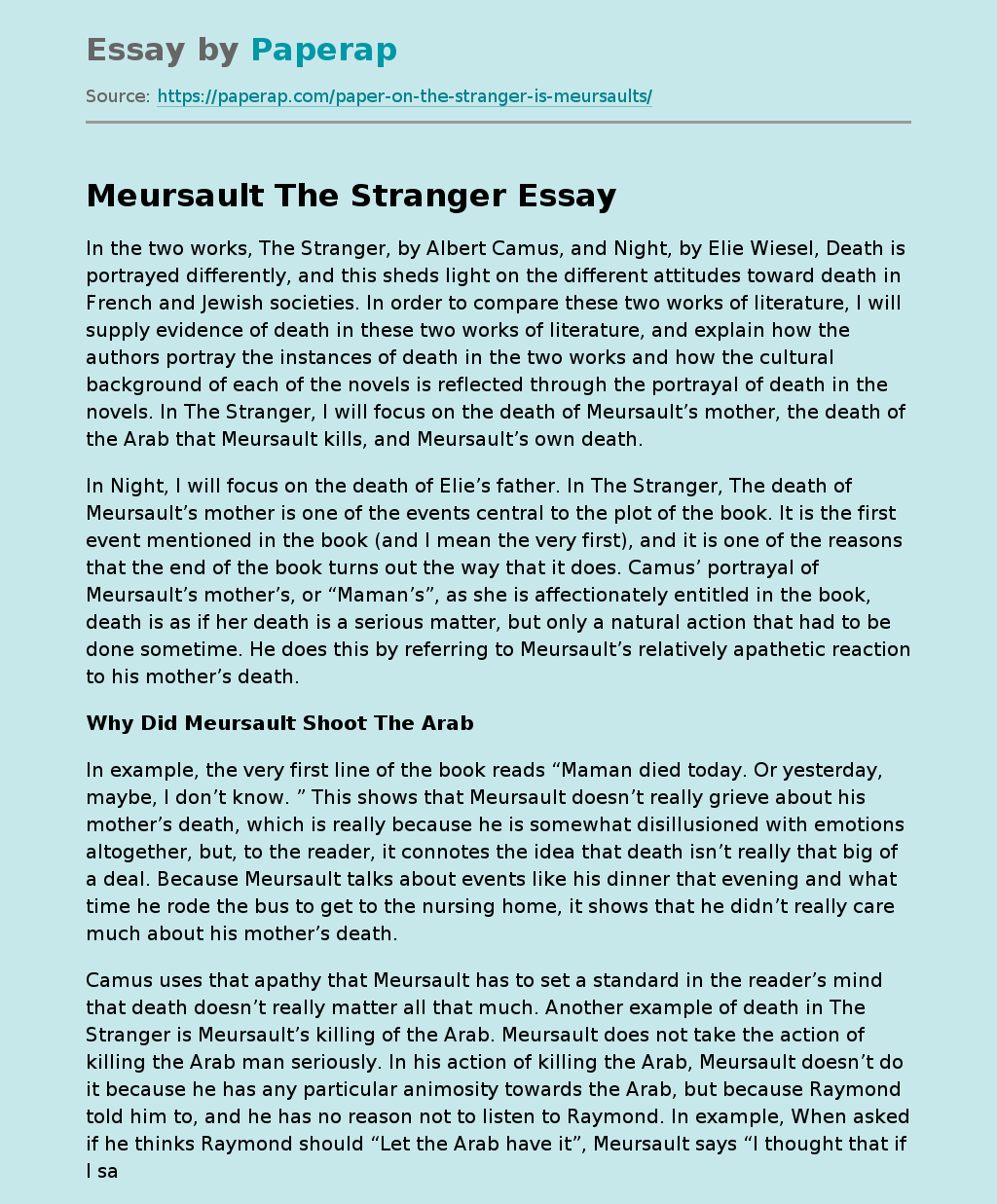Why Did Meursault Shoot The Arab
In the two works, The Stranger, by Albert Camus, and Night, by Elie Wiesel, Death is portrayed differently, and this sheds light on the different attitudes toward death in French and Jewish societies. In order to compare these two works of literature, I will supply evidence of death in these two works of literature, and explain how the authors portray the instances of death in the two works and how the cultural background of each of the novels is reflected through the portrayal of death in the novels.
In The Stranger, I will focus on the death of Meursault’s mother, the death of the Arab that Meursault kills, and Meursault’s own death.
In Night, I will focus on the death of Elie’s father. In The Stranger, The death of Meursault’s mother is one of the events central to the plot of the book. It is the first event mentioned in the book (and I mean the very first), and it is one of the reasons that the end of the book turns out the way that it does.
Camus’ portrayal of Meursault’s mother’s, or “Maman’s”, as she is affectionately entitled in the book, death is as if her death is a serious matter, but only a natural action that had to be done sometime. He does this by referring to Meursault’s relatively apathetic reaction to his mother’s death.
In example, the very first line of the book reads “Maman died today. Or yesterday, maybe, I don’t know.
” This shows that Meursault doesn’t really grieve about his mother’s death, which is really because he is somewhat disillusioned with emotions altogether, but, to the reader, it connotes the idea that death isn’t really that big of a deal. Because Meursault talks about events like his dinner that evening and what time he rode the bus to get to the nursing home, it shows that he didn’t really care much about his mother’s death.
Camus uses that apathy that Meursault has to set a standard in the reader’s mind that death doesn’t really matter all that much. Another example of death in The Stranger is Meursault’s killing of the Arab. Meursault does not take the action of killing the Arab man seriously. In his action of killing the Arab, Meursault doesn’t do it because he has any particular animosity towards the Arab, but because Raymond told him to, and he has no reason not to listen to Raymond. In example, When asked if he thinks Raymond should “Let the Arab have it”, Meursault says “I thought that if I said no he’d get himself all worked up and shoot for sure.
All I said was ‘He hasn’t said anything yet. It’d be pretty lousy to shoot him like that. ‘” (56). This shows that Meursault wasn’t really killing the Arab because he cared about the issue that Raymond was animate about; in fact, he didn’t even really want the poor man to die. In the act of killing the Arab, Meursault doesn’t talk about having a motive for his action, but instead blames it on physical stimuli. “All I could feel were the cymbals of sunlight crashing on my forehead and, indistinctly, the dazzling spear flying up from the knife in front of me.
The scorching blade slashed at my eyelashes and stabbed at my stinging eyes… My whole being tensed and I squeezed my hand around the revolver. ” (59) This shows that Meursault didn’t even really have an emotional or pre-cognized reason for killing the Arab, so the death of the Arab wouldn’t mean all that much to him. Therefore, Camus is again using Meursault’s reaction as an example of his reaction to death. The last example of death in The Stranger, or L’Etranger is in Meursault’s own execution and death.
Why Did Meursault Shoot The Arab. (2019, Dec 05). Retrieved from https://paperap.com/paper-on-the-stranger-is-meursaults/

